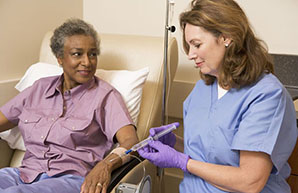Cancer cells grow and divide quickly – chemotherapy is a drug treatment that works by targeting all cells that behave in this way. "Chemotherapy kills the cell by damaging the part of the control centre inside each cell that makes cells divide, or it may interrupt the chemical processes involved in cell division," explains Professor Michael Herbst of the Cancer Association of South Africa (CANSA).
The problem is that cancer cells are not the only cells that divide quickly – so do cells in your skin, hair, intestines and bone marrow. The chemo drugs attack these cells too, resulting in unpleasant side effects.
What to expect from treatment
Chemotherapy can be used to cure cancer on its own, it can be used in combination with other treatments such as surgery or radiation, or it can be used as a form of palliative care in patients with terminal cancer.
Chemo drugs — which can take the form of a pill, an injection, an infusion, or a cream or gel that you apply directly to your skin — are usually given in cycles. Each cycle is made up of a “drug period” and a “recovery period.” The recovery period gives your body time to recover from the side effects of the treatment. Drugs are administered on different schedules depending on the type of cancer, the stage of the cancer and health of the patient. However, Herbst says that "most cancer chemotherapy cycles are either once every three weeks for standard chemo or weekly for low-dose chemo."
The side effects of chemo
"It's difficult to predict exactly what side effects you will experience while having chemotherapy. Different people react to treatment in different ways. A small number of people have few or even no side effects," explains Herbst.
Common side effects of chemo include hair loss, nausea, vomiting, anaemia, fatigue, flu-like symptoms, lowered immune response, constipation or diarrhoea, bleeding, reduced interest in sex, skin problems and loss of appetite.
Some forms of chemotherapy can also cause infertility, so it is important to talk to your doctor or a fertility specialist before undergoing treatment if you hope to one day have children. Because chemo can also cause birth defects, it is important to practice safe sex during treatment.
"While the side effects of chemotherapy can be distressing, most do not pose a serious threat to your health. However, occasionally some side effects can be very serious. For example, if one has a rapid fall in white blood cells, one may be vulnerable to a serious infection," cautions Herbst.
10 tips for coping with chemo
- Fatigue: Get plenty of rest and don't be afraid to ask for help when you need it. Light exercise such as yoga, swimming or walking can help boost energy levels.
- Hair loss: Shaving your head or picking out a wig before you begin chemo can help you feel more in control of the process.
- Constipation: Eat high fibre foods and drink at least eight cups of water or fluid each day.
- Diarrhoea: Eat low fibre foods, drink plenty of clear fluid, and replace sodium and potassium by eating bananas, oranges and potatoes.
- Infection: Wash your hands regularly with soap and water and stay away from crowds and sick people. Clean cuts and scrapes straight away with warm water and soap.
- Nausea: Eat small meals and snacks made up of bland, easy-to-digest foods.
- Anaemia: Eat foods that are high in iron such as dark green leafy vegetables, beans, nuts, prunes, apricots and raisins.
- Loss of appetite: Replace solid food with smoothies, soup or juice if you can't face a meal. Engage in a little light exercise to work up an appetite.
- Bleeding: As chemo destroys cells called platelets which help your blood clot, you could bleed profusely if you injure yourself. Hence, use a very soft toothbrush, use an electric shaver instead of a razor, be careful when handling sharp objects, and blow your nose gently to ensure you don’t start bleeding.
- Anxiety: Joining a support group or an online forum for people undergoing chemo can help reduce feelings of stress or isolation. It might also help to practice mediation or relaxation exercises.
For more information visit the CANSA website or call the CANSA helpline on 0800 22 66 22.
IMAGE CREDIT: 123rf.com

